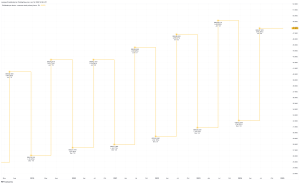I’m always scanning the UK stock market for value, and occasionally find that the largest companies in the market are trading for far less than expected. I recently took a closer look at pharmaceutical giant AstraZeneca (LSE: AZN), a FTSE 100 heavyweight.
In a tough period
The shares are experiencing the most significant weekly decline since July 2023. This is primarily due to disappointing results from a late-stage trial of an experimental lung cancer drug developed in partnership with Daiichi Sankyo. This setback has prompted some analysts to downgrade the stock to ‘sell’.
However, smart investors know it’s crucial to look beyond short-term volatility and consider the broader financial picture and long-term prospects. The company’s latest financial report reveals annual revenue of £37.45bn and earnings of £4.91bn. Particularly noteworthy is the firm’s impressive gross margin of 82.62%, which demonstrates the company’s ability to maintain impressive profits in a competitive industry.
To me though, the valuation is the most interesting part. According to a discounted cash flow (DCF) calculation, the shares are trading at approximately 51% below estimated fair value. This significant discount suggests that the market may be undervaluing the company, possibly due to an overreaction to recent news. Such an estimate can be more of an art than a science though, and it’s possible that the market is simply reflecting a lot of uncertainty.
So of course, it’s important to acknowledge the risks. The company carries a substantial debt load. There are also numerous challenges on the horizon, including the impending US patent expiry of its blockbuster drug Farxiga and pricing pressures in the Chinese market. These factors undoubtedly contribute to the current negative feeling surrounding the shares.
Reasons for optimism
Under the leadership of CEO Pascal Soriot, the company has successfully transformed itself into a leader in oncology and rare diseases. Moreover, the firm boasts a robust pipeline of potential blockbuster drugs that could drive future growth and help offset current setbacks.
The growth prospects are particularly noteworthy. Analysts forecast earnings growth of 16% per year, a figure that outpaces many peers and the broader market average. This trajectory suggests that the company is pretty well-positioned to navigate the current challenges and emerge stronger.
The shares offer a dividend yield of 1.9%. Obviously this is far from the highest yield in the FTSE 100. However, the company’s conservative payout ratio of 71% indicates plenty of room for future dividend growth as earnings expand.
One for the future
So while AstraZeneca is certainly facing a few problems, the current share price may represent an attractive opportunity for long-term investors. The company’s strong fundamentals, diverse product portfolio, and promising pipeline suggest that it’s well-equipped to weather its current storm.
The pharmaceutical industry is known for its volatility, and even well-established companies like AstraZeneca are not immune to the occasional setback. However, as an investor with a long-term perspective and a tolerance for some near-term uncertainty, I’m treating the current situation as an opportunity hiding in plain sight, and will be buying the shares at the next opportunity.
This post was originally published on Motley Fool







